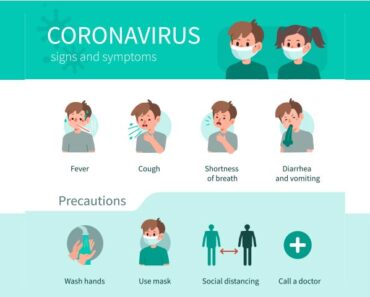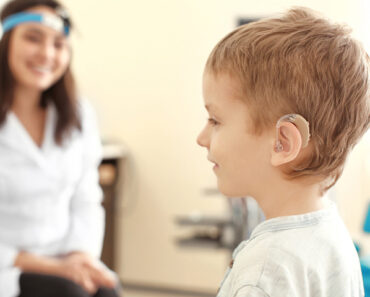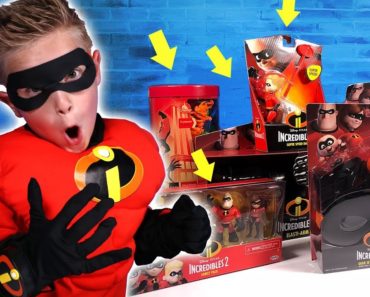The common cold is a self-limiting viral infection of the upper respiratory tract, including the nose and throat. Although anyone can catch a cold, children may have a higher risk of catching a cold.
Cold symptoms may improve within a week or two, and it is recommended that you take your child to a pediatrician if the symptoms do not improve within this time (1).
Read this post to know more about the causes, symptoms, risk factors, complications, diagnosis, treatment, and prevention of common colds in children.
What Causes A Cold?
Various respiratory viruses can cause cold. There are more than 200 viruses known to cause common cold in humans. Rhinoviruses are the most common cause of cold and are also associated with sinus infections, ear infections, and asthma attacks (2).
Other common viruses that cause cold are (2):
- Human parainfluenza virus
- Adenovirus
- Human coronaviruses
- Respiratory syncytial virus
- Human metapneumovirus
How Do Children Catch Colds?
The common cold is a highly contagious disease. Your child may catch a cold from contact with someone who has been infected with cold viruses.
The common cold germs can spread in the following ways (3).
- Cough or sneeze of an infected person could cause cold viruses to spread through respiratory droplets in the air. Breathing these respiratory droplets could cause viruses to settle in the nasal membrane.
- Touching the nose, mouth, and eyes with unwashed hands after direct contact with an infected person could cause cold.
- Contact with objects, such as utensils, toys, tables, or doorknobs, touched by an infected person or contaminated by respiratory droplets, may transmit viruses.
Is It Normal To Get Multiple Colds In A Year?
Most children may have six to eight colds a year. The incidence of colds may reduce after the age of six years when a child tends to develop immunity towards most cold viruses (4). Children who live in crowded areas or attend daycare may have more number of colds per year.
Cold is the leading cause of healthcare visits and missed days from school among children than any other illness (4). Children are more likely to catch colds during the fall and winter than in any other season.
Signs And Symptoms Of Cold In Children
The symptoms usually begin within one to three days after contact with a cold virus. These may include (2):
- Runny nose or stuffy nose
- Throat irritation or sore throat
These symptoms may also be seen in other diseases such as flu. Seek medical care for exact diagnosis, especially if the symptoms are severe or persist for a longer time.
Risk Factors And Complications Of Cold In Children
The risk of catching a cold is more in children than adults due to the following factors (5).
- Attending daycare or school since it easily spreads at these places
- Touching the mouth, nose, and eyes with unwashed hands
- Conditions such as stress and sleep problems, malnutrition, and chronic illnesses
Possible complications of common cold infection may include (5):
- Acute ear infection such as otitis media, which is the infection of the area behind the eardrum and is associated with symptoms such as earaches or ear pain, fever, and green or yellow discharge from the nose
- Throat infections, such as strep throat or streptococcal pharyngitis
- An asthma attack may be triggered during cold infection
Common cold can also lead to secondary or superimposed bacterial infections or respiratory distress. Always seek help from a pediatrician if the symptoms do not resolve in a few days to avoid complications.
When To See A Doctor
If your child has any of the following signs or symptoms, seek immediate medical care (4).
- Unresolved symptoms for more than ten days
- Severe symptoms that do not get better with over-the-counter medicines
Diagnosis Of Cold In Children
Healthcare providers usually diagnose cold based on the symptoms. Blood tests, sputum culture, chest X-ray, or other tests may often be ordered to check for bacterial infections, allergies, etc.
Home Remedies For Cold In Children
The following home treatments may help ease symptoms of the common cold in children (4) (6).
- Get enough rest and sleep for fast recovery.
- Drink more fluids including, water, diluted apple juice, electrolyte solutions, warm soups, etc. to prevent dehydration.
- Use saline nasal sprays to ease stuffy nose or nasal congestion.
- Avoid exposure to cigarette smoke and respiratory irritants.
- Cool-mist humidifiers may help reduce breathing problems.
- Avoid caffeinated beverages to prevent dehydration.
Herbs, minerals, and other popular cold remedies, such as echinacea, garlic, lemon, honey, eucalyptus, zinc, menthol, vitamin C, etc. lack strong scientific support (6).
You may give over-the-counter (OTC) medications to ease symptoms after discussing with your child’s pediatrician.
Observe the following cautions while giving OTC medications for cold (7) (8).
- Do not give ibuprofen to infants younger than six months.
- Do not give cough or cold medicines to children younger than four years unless prescribed by a doctor.
- Do not give aspirin to children younger than 19 years of age since it may cause Reye syndrome.
Treatment For Common Cold In Children
There is no specific cure for the common cold. It resolves on its own, usually in a week or two. However, if the symptoms are severe, symptomatic treatment is provided, such as decongestant for nasal congestion, fever medicines, and pain relievers (9).
Cough and cold medicines are not recommended for children younger than four years due to potential side effects (8). You may also seek pediatrician prescription for cold medicines for a child above four years for the right dosage based on the child’s age and weight.
Note: Antibiotics are not useful for treating common cold since it is not effective against viral infections (8).
How To Prevent Colds In Children?
There is no vaccine or medicines to prevent the common cold. However, the following precautions may help reduce the incidences of the common cold in children (2).
- Wash hands with soap and water or use sanitizers
- Follow cough and sneeze etiquette
- Disinfect toys, doorknobs, and other repeatedly touched objects or surfaces
- Remind children not to touch their face with unwashed hands
- Keep a distance from an infected family member
If your child has to attend school, ask them to wear a mask, wash hands, or cover their mouth and nose while coughing or sneezing to prevent infecting others.
Although the common cold is the most frequent infectious disease in children, the self-limiting infection resolves within a week or two. You may teach hand-washing techniques and cough and sneeze etiquette to your child from an early age to reduce the risk of catching and spreading cold.

































